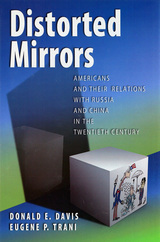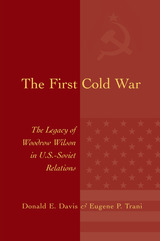2 books by Trani, Eugene P.

Distorted Mirrors
Americans and Their Relations with Russia and China in the Twentieth Century
Donald E. Davis & Eugene P. Trani
University of Missouri Press, 2009
As the United States enters the twenty-first century, it confronts two powers that loomed less large on the world stage a century before. Yet American policies toward Russia and China have been shaped by attitudes going back even further, as this new book relates.
Distorted Mirrors traces American prejudices toward the two countries by focusing on the views of influential writers and politicians over the course of the twentieth century. Donald Davis and Eugene Trani show where American images of Russia and China originated, how they evolved, and how they have often helped sustain foreign policies generally negative toward the former and positive toward the latter.
This wide-ranging survey draws on memoirs, archives, and interviews, much the material appearing in print for the first time, to show how influential individuals shaped these perceptions and policies based on what they saw—or thought they saw—in those two countries. Through a series of tableaux that traces America’s relations with Russia and China through the twentieth century, the authors show how personalities of certain players impacted interpretation of key situations and conflicts and how cultural attitudes toward Russia and China became ingrained and difficult to dislodge.
The book traces formative attitudes back to two late-nineteenth-century books, with George Kennan’s Siberia and the Exile System painting a grim picture of tsarist penal colonies and William Rockhill’s Land of the Lamas depicting China as an exotic Shangri-la. Davis and Trani show how these images were sustained over the years: for Russia, by Slavic expert Samuel Harper, State Department official Robert Kelley, journalist Eugene Lyons, ambassador William Bullitt, President Franklin D. Roosevelt, and policymakers George F. Kennan and Paul Nitze; and for China, by President Woodrow Wilson, philosopher John Dewey, journalist Edgar Snow, novelist Pearl S. Buck, ambassador Nelson T. Johnson, FDR, journalist Theodore White, and statesman Henry Kissinger. They also relate how Ronald Reagan and George H. W. Bush tried to replace these misconceptions with a policy of accommodation, and they assess the state of current U.S. attitudes and policies.
Distorted Mirrors marks a fresh approach to U.S. relations with these countries, emphasizing long-term attitudes that influenced policies rather than the reverse. It shows us that perceptions shaped over the course of the twentieth century are crucial for their bearing on the twenty-first, particularly if those unrestrained prejudices reemerge.
[more]

The First Cold War
The Legacy of Woodrow Wilson in U.S. - Soviet Relations
Donald E. Davis & Eugene P. Trani
University of Missouri Press, 2002
In The First Cold War, Donald E. Davis and Eugene P. Trani review the Wilson administration’s attitudes toward Russia before, during, and after the Bolshevik seizure of power. They argue that before the Russian Revolution, Woodrow Wilson had little understanding of Russia and made poor appointments that cost the United States Russian goodwill. Wilson later reversed those negative impressions by being the first to recognize Russia’s Provisional Government, resulting in positive U.S.–Russian relations until Lenin gained power in 1917.
Wilson at first seemed unsure whether to recognize or repudiate Lenin and the Bolsheviks. His vacillation finally ended in a firm repudiation when he opted for a diplomatic quarantine having almost all of the ingredients of the later Cold War. Davis and Trani argue that Wilson deserves mild criticism for his early indecision and inability to form a coherent policy toward what would become the Soviet Union. But they believe Wilson rightly came to the conclusion that until the regime became more moderate, it was useless for America to engage it diplomatically.
The authors see in Wilson’s approach the foundations for the “first Cold War”—meaning not simply a refusal to recognize the Soviet Union, but a strong belief that its influence was harmful and would spread if not contained or quarantined. Wilson’s Soviet policy in essence lasted until Roosevelt extended diplomatic recognition in the 1930s. But The First Cold War suggests that Wilson’s impact extended beyond Roosevelt to Truman, showing that the policies of Wilson and Truman closely resemble each other with the exception of an arms race. Wilson’s intellectual reputation lent credibility to U.S. Cold War policy from Truman to Reagan, and the reader can draw a direct connection from Wilson to the collapse of the USSR. Wilsonians were the first Cold War warriors, and in the era of President Woodrow Wilson, the first Cold War began.
[more]
READERS
Browse our collection.
PUBLISHERS
See BiblioVault's publisher services.
STUDENT SERVICES
Files for college accessibility offices.
UChicago Accessibility Resources
home | accessibility | search | about | contact us
BiblioVault ® 2001 - 2024
The University of Chicago Press









